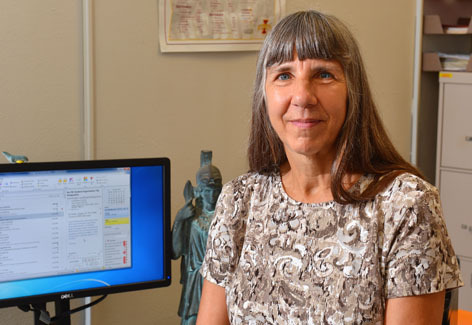
Faculty Senate president Veronica Dark. Photo by Bob Elbert.
Position
Professor and director of undergraduate students in the psychology department
Years at Iowa State
27
Describe your work.
My research area is selective attention; I'm a cognitive psychologist by training. I put people in front of a computer, overwhelm them with information and determine what they can pick up. I look at the variables that influence what it is that they are able to pick up when there is too much information.
What one word would you use to describe yourself?
Scuba diver.
What interests do you have outside of work?
Scuba diving and my grandkids (5-year-old twins). Once a year, I go to Bonaire -- off the coast of Venezuela and a part of the Netherlands. There is nothing to do on that island except scuba dive. It's perfect.
What strengths do you bring to the Faculty Senate presidency?
I've been here a long time, so I have a lot of background knowledge. I'm a good listener and I'm -- what I'll call -- quietly assertive.
What is your top senate priority this year?
We're going to examine the position responsibility statement (PRS). That's really an important document for each faculty member because it's the basis of annual evaluations and promotion and tenure decisions. It's my understanding that there is wide, wide variability across campus in the nature of the PRS. It's time we looked at it and maybe came up with some best practices or guidelines.
What challenges face the senate this year?
The main challenge for the senate is for everyone involved to take it seriously. Not all senators report the issues that the senate is discussing to their departments in order to get feedback. It should be a two-way communication.
There have been times in the past when central administration hasn't thought of the senate when it should. The senate represents the entire faculty. Asking a faculty member to be part of a group isn't sufficient; they should involve the senate.
We need to enhance communication, maybe by writing short executive summaries of senate meetings for department chairs and for senators to forward to their constituencies. We could do the same for senate councils and committees. Faculty need to know the issues being discussed so they have a chance to give input.